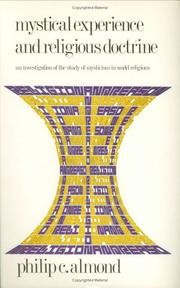| Listing 1 - 3 of 3 |
Sort by
|
Book
ISBN: 1316235203 1316237095 1316048020 110708511X 1107448344 Year: 2015 Publisher: Cambridge : Cambridge University Press,
Abstract | Keywords | Export | Availability | Bookmark
 Loading...
Loading...Choose an application
- Reference Manager
- EndNote
- RefWorks (Direct export to RefWorks)
What are religions? Why is it important to understand them? One answer is that religions and religious believers are extremely bad news: they are deeply involved in conflicts around the globe; they harm people of whom they disapprove; and they often seem irrational. Another answer claims that they are in fact extremely good news: religious beliefs and practices are universal and so fundamental in human nature that they have led us to great discoveries in our explorations of the cosmos and of who we are. The sciences began as part of that religious exploration. John Bowker demonstrates that there is truth in both answers and that we need both to understand what religion is and why it matters. He draws on many disciplines - from physics, genetics and the neurosciences to art, anthropology and the history of religions - to show how they shed entirely new light on religion in the modern world.
Religion --- Religions. --- Comparative religion --- Denominations, Religious --- Religion, Comparative --- Religions, Comparative --- Religious denominations --- World religions --- Civilization --- Gods --- Philosophy.
Book
ISBN: 131632429X 1316310914 1316327639 1316330974 1316334317 1107499135 1316320936 1316181995 1107101522 1316317595 131629028X 9781316320938 9781316181997 9781107101524 9781107499133 Year: 2015 Publisher: Cambridge : Cambridge University Press,
Abstract | Keywords | Export | Availability | Bookmark
 Loading...
Loading...Choose an application
- Reference Manager
- EndNote
- RefWorks (Direct export to RefWorks)
Difference, diversity and disagreement are inevitable features of our ethical, social and political landscape. This collection of new essays investigates the ways that various ethical and religious traditions have dealt with intramural dissent; the volume covers nine separate traditions: Confucianism, Buddhism, Christianity, Judaism, Islam, liberalism, Marxism, South Asian religions and natural law. Each chapter lays out the distinctive features, history and challenges of intramural dissent within each tradition, enabling readers to identify similarities and differences between traditions. The book concludes with an Afterword by Michael Walzer, offering a synoptic overview of the challenge of intramural dissent and the responses to that challenge. Committed to dialogue across cultures and traditions, the collection begins that dialogue with the common challenges facing all traditions: how to maintain cohesion and core values in the face of pluralism, and how to do this in a way that is consistent with the internal ethical principles of the traditions.
Conflict management. --- Conflict management--Religious aspects. --- Religions. --- Religions --- Conflict management --- Religion --- Philosophy & Religion --- Religion - General --- Conflict control --- Conflict resolution --- Dispute settlement --- Management of conflict --- Managing conflict --- Management --- Negotiation --- Problem solving --- Social conflict --- Crisis management --- Comparative religion --- Denominations, Religious --- Religion, Comparative --- Religions, Comparative --- Religious denominations --- World religions --- Civilization --- Gods --- Religious aspects --- Religious aspects.

ISBN: 9027931607 3110823985 9783110823981 9789027931603 Year: 2015 Volume: 26 Publisher: Berlin Boston
Abstract | Keywords | Export | Availability | Bookmark
 Loading...
Loading...Choose an application
- Reference Manager
- EndNote
- RefWorks (Direct export to RefWorks)
Mysticism --- Experience (Religion) --- Religions --- Study and teaching --- History --- Comparative studies --- 291.4 --- -Mysticism --- -Experience (Religion) --- -Religions --- Comparative religion --- Denominations, Religious --- Religion, Comparative --- Religions, Comparative --- Religious denominations --- World religions --- Civilization --- Gods --- Religion --- Religious experience --- Psychology, Religious --- Dark night of the soul --- Mystical theology --- Theology, Mystical --- Spiritual life --- Negative theology --- Godsdienstwetenschap: religieus leven; ascese; vroomheid; mystiek --- -History --- Religions. --- Comparative studies. --- History. --- 291.4 Godsdienstwetenschap: religieus leven; ascese; vroomheid; mystiek --- Study and teaching&delete& --- Mysticism - Study and teaching - History --- Mysticism - Comparative studies --- Experience (Religion) - Comparative studies
| Listing 1 - 3 of 3 |
Sort by
|

 Search
Search Feedback
Feedback About
About Help
Help News
News